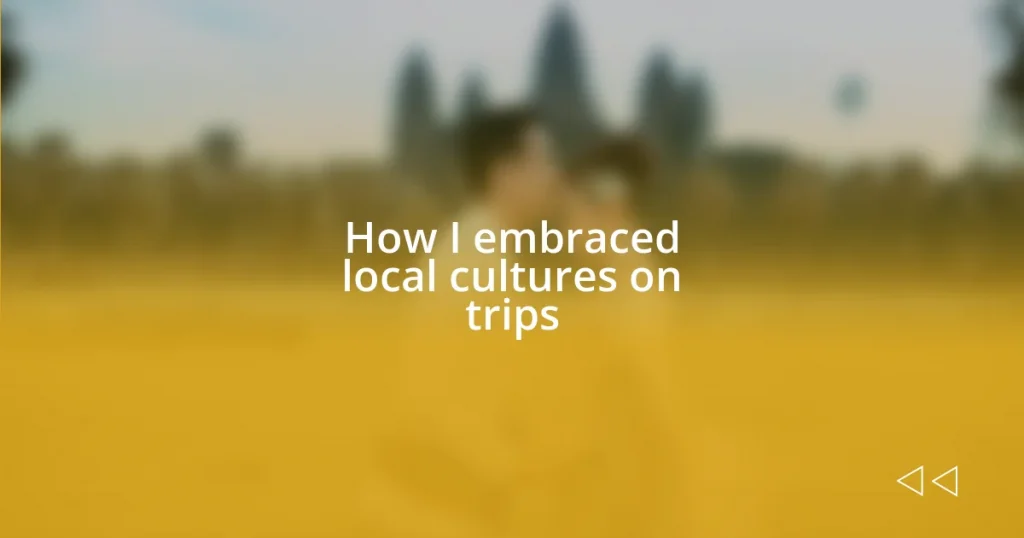Key takeaways:
- Researching local customs enhances cultural appreciation and helps avoid social faux pas, transforming travel into meaningful engagement.
- Trying authentic local cuisine offers a deep connection to a region’s culture, with food serving as a bridge to understanding local traditions.
- Learning basic local language phrases fosters connections with locals and enriches travel experiences, making interactions more engaging and respectful.

Researching Local Customs and Traditions
Before setting off on my travels, one of the first things I do is dive into the local customs and traditions of my destination. I remember flipping through a travel guide before my trip to Japan, feeling both excited and overwhelmed. Would I understand the nuances of their bowing etiquette? It was a fascinating way to connect with the culture even before my feet hit the ground.
In my experience, researching these customs has led to some unforgettable moments. For instance, while attending a traditional tea ceremony in Kyoto, I found myself moved by the ritual’s grace and detail. It was heartwarming to witness the meticulous way the host prepared each element, reminding me just how much care goes into honoring these cultural practices. Have you ever participated in something so steeped in history that it made you appreciate the present even more?
Exploring local traditions also helps avoid any social faux pas that could unintentionally offend. I learned this the hard way during a visit to a market in Morocco, where I unknowingly pointed with my finger—a gesture that can be seen as rude. Understanding these little intricacies truly enhances the travel experience, transforming it from merely sightseeing to meaningful engagement. After all, isn’t travel much richer when you can relate meaningfully to the culture around you?

Trying Authentic Local Cuisine
Trying local cuisine is one of the most exhilarating parts of traveling. On a trip to Thailand, I made it a point to seek out street food stalls instead of high-end restaurants. I recall the burst of flavors when biting into a spicy papaya salad, so different from what I’d ever tasted back home. Each dish felt like a storytelling moment, reflecting the region’s culture, ingredients, and history.
I also learned to be adventurous during my culinary explorations. Once, in a tiny eatery in rural Spain, I tried a dish called ‘cochinillo asado’—suckling pig cooked to perfection. The crispy skin combined with tender meat was an experience that I often find myself reminiscing about. Food has this magical ability to evoke emotions and memories, and I believe it’s an integral part of connecting deeply with a place. Have you ever tasted something that made you feel like you were experiencing the heart of a culture?
When you savor authentic local cuisine, it’s not just about eating; it’s about engaging with the essence of the place. In Peru, sharing a meal of ceviche with locals allowed me a glimpse into their way of life. Their pride as they explained the dish’s preparation added layers of meaning to every bite. Using food as a bridge, I found that I was not just a tourist—I was part of their narrative, albeit for a brief moment.
| Destination | Dish |
|---|---|
| Thailand | Spicy Papaya Salad |
| Spain | Cochinillo Asado |
| Peru | Ceviche |

Learning Basic Local Language
When I venture into a new country, I always make it a point to learn a few basic phrases in the local language. It’s incredible how saying “hello” or “thank you” can spark a connection with locals. I remember standing in a bustling market in Mexico, practicing my “buenos días” with enthusiastic vendors. Their faces lit up, not just because I attempted their language, but because it showed my respect for their culture.
One time, while navigating the charming streets of Paris, I confidently ordered my coffee in French. “Un café, s’il vous plaît.” The barista’s smile was priceless, and that simple interaction turned my day around. I often find myself reflecting on how learning basic phrases has the power to transform an experience from being a passive observer to an active participant. Have you ever felt such elation from a small victory in a foreign language?
Once, during a hike in the Italian Dolomites, I bumped into a local who spoke only Italian. Despite our language barrier, we communicated effortlessly through gestures and a shared appreciation for the breathtaking view. It reminded me that language can sometimes be more than just words; it’s about the essence of connection. I’ve learned that even if my pronunciation isn’t perfect, the effort resonates deeply. Don’t you think that language is a bridge, allowing us to step into someone else’s world?















